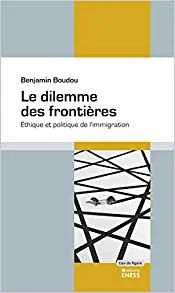THE ETHICS AND POLITICS OF IMMIGRATION
Benjamin Boudou
(Éditions EHESS, 264 pages, 2018)
The Universal Declaration of Human Rights establishes humanity’s fundamental right to move freely within a nation-state. Everyone has the right to emigrate—to leave any country, including one’s own—but the right to immigrate is limited. This fundamental asymmetry can have fatal consequences, as shown by the deaths of thousands of immigrants today. If national borders are meant to protect citizens and safeguard institutions based on values of freedom and equality for all, then the discriminatory and repressive policing at the frontiers betrays those same values.
Benjamin Boudou addresses this dilemma head on, and the burning theoretical and political questions it raises about the future of Western democracies. Boudou provides us with the tools to reimagine a world without borders—a not-so-ancient or abstract ideal—in order to make it, one day, possible. In The Ethics and Politics of Immigration, he invites us to reconsider the way in which we define borders, even the ones generally accepted as “natural” (for example, the Pyrenees mountains). Drawing on contemporary political philosophy, he reconstructs the conflicting arguments used to legitimize and reinforce the existence of borders, noting when they contradict democratic and liberal principles. Boudou then hypothesizes a world without borders, embracing a radical vision while acknowledging the urgent need for concrete proposals. One starting point, he suggests, would be to apply the “all-affected principle”—the idea that all parties affected by a decision have the right to participate in making that decision—to the issue of immigration. If we are able to establish or abolish existing borders and limitations on immigrant rights, the immigrants’ interests must also be taken into account. Acknowledging that we cannot immediately implement a system for a borderless world, Boudou advocates for more-open political representation for noncitizens by forming a parliament of immigrants.
While he is aware that political theory may seem abstract, Boudou demonstrates its relevance by reminding us that thought and action are not opposed, especially in an increasingly polarized political climate. The challenging questions he asks in this stimulating and clearly argued book, and the tentative solutions he offers, are a great point of departure for addressing one of the pressing issues of our time.
Benjamin Boudou holds a Ph.D. in political science from the Institute of Political Studies (Sciences Po) in Paris. He is currently a senior research fellow at the Max Planck Institute for the Study of Religious and Ethnic Diversity in Germany in the Department of Ethics, Law and Politics.His work focuses on questions of ethics and politics of migration, hospitality, citizenship, and theory of democracy.In 2017, C.N.R.S. Éditionspublished his first book, Politique de l’hospitalité: Une généalogie conceptuelle. He is also the editor-in-chief of Raisons Politiques, a French peer-reviewed journal of political theory.

